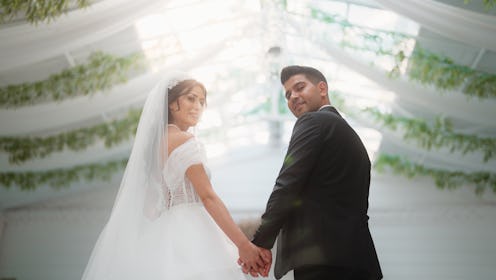
In the latest episode of her series The Dirty Word, linguist Amanda Montell addresses a tendency she's noticed both in herself and in many people she knows: A hatred of the words "husband" and "wife." In the episode, called "I Hate the Words HUSBAND and WIFE," she explores both the aesthetic and social reasons why this may be. These terms not only have unpleasant sounds, she argues, but also have some offensive connotations.
The video brings up several accounts proving that if you don't like these words, you're not alone. Tracy Clark-Flory wrote in Salon in 2013 that she was "ready to marry, but not for 'wife,'" calling it a "four-letter word." Bitch Media co-founder Andi Zeisler told Salon, "I hate them both, but will use them grudgingly. I’ll sometimes use the term ‘my mate,’ because it sounds companionate."
Montell herself has a hard time saying "husband" and "wife," she tells Bustle. "I avoid using them to such an extent that half the reason my boyfriend of seven years and I aren't already married is because the word 'wife' gives me a queasy feeling. I just don't identify with the obedient, apron-wearing, laundry-folding lady that I picture when I hear that word." She explains this further in the video here.
So, why are "husband" and "wife" getting so much hate? Here are some theories Montell puts forth.
They Just Don't Sound Good
The most pleasant sounds to our ears are ones like "ma" and "da" that roll off the tongue, Montell explains in the video. Hilariously, these are common sounds in both baby balk and swear words. But they're not in "husband" and "wife." Instead, "husband is long and cumbersome and wife is way too harsh," she says. And since they have two totally different origins, they don't seem to go together.
Their Connotations Are Problematic
If "husband" and "wife" hold negative connotations for you, it's not your imagination. On top of being used in heteronormative, gender-stereotypical ways, they actually come from old words that reflect traditional, sexist views of marriage. "Wife" comes from an Old English word for "woman" — hence words like "midwife" — which implies that the primarily role of a woman is as a wife. Husband is worse: It comes from an Old English term for "head of household."
They're Used In Problematic Ways
Even without knowing their medieval roots, "husband" and "wife" have had sexist connotations in more recent history. "Because of the centuries of heteronormative expectations for how husbands and wives should act, merely the word 'husband' conjures a patriarch, while the word 'wife' evokes a submissive 1950s Susie Homemaker," Montell says in the video. These implications are even engrained in marriage ceremonies: couples are pronounced "man and wife," as if he remains a man like was was before, but her title now describes her relationship to him.
Not Everyone Can Use Them
Using the words "husband" and "wife" requires you to share your spouse's gender, which some people may not feel comfortable doing and others may not be able to do because their spouse doesn't identify as male or female. "Many people feel it too personal to reveal the gender of their marital partner right away. For same sex couples, this sadly might not even be safe in some situations," Montell tells Bustle. "I have a close friend with a gender non-conforming partner who once expressed severe anxiety over what to call them if they get married."
So, what can we say instead? Montell asked some of her viewers what they'd prefer, and they came up with "match," "plus," "spouse," "person," "marrí," "ring buddy," "primary mating companion," "domestic co-conspirator," and "homie for life." While her personal favorites are "match" since it sounds like "matrimony" and "homie for life" and "domestic co-conspirator" because they're "cheeky and endearing," "spouse" may be the easiest transition. Plus, it's gender neutral, since it stems from Latin word "spondere" for "bethroth."
While it's still not typical to hear people say "my spouse will be here in five minutes" or "my first date with my spouse was in 1995," Montell doesn't see any reason we can't start. "I encourage people to try it out in natural conversation, see how it's received, and report back!" she tells Bustle. Then again, there's no harm in saying "ring buddy" either if that's the phrase that captures your love.